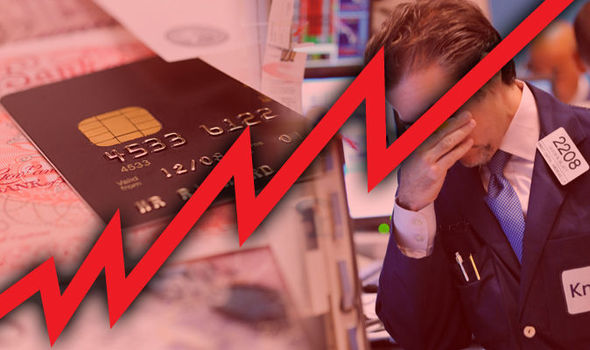HISTORY REPEATING? Fears of ANOTHER financial crisis as borrowing reaches 11-year high

BRITISH households racked up debts at the fastest rate since March 2005 — the run up to the financial crisis — sparking fears of a borrowing bubble inflated by low interest rates.
Consumer credit, including credit cards and personal loans, grew by 9.7 per cent to reach £1.9billion in March.
The last time growth was this high was before the financial crisis of 2007.
The figures have raised concerns that low interest rates and cheap money is pushing Britain's debt habit out of control.
And borrowers could again be left struggling when interest rates eventually rise back up — or if the economy takes a sudden turn for the worse.
Tashema Jackson, money expert at comparison site switch.com, said: "While rock-bottom interest rates have helped consumers get great introductory offers and low mortgage rates, it also means the temptation to borrow beyond our means has seldom been higher.
“Banks and credit card providers have an important role to play in preventing borrowing spiralling out of control."
Experts said there has already been a rise in the number of people struggling with debt repayments this year.
Peter Tutton, head of policy at StepChange debt charity, said: "Consumer credit has again risen rapidly and this is an area of growing concern.
"Slow wage growth and the rise in insecure jobs have left millions of households financially vulnerable and we have already seen an increase in the number of people coming to us for debt advice in 2016."
He added: "If consumer credit continues to rise quickly, it risks increasing the vulnerability of households who are already struggling to make ends meet.
"The last time consumer credit increased at this rate was in the lead-up to the recession, when credit was widely available and many households became seriously indebted.
"Creditors must ensure they carry out thorough affordability checks and lend responsibly to ensure that the mistakes made back then are not repeated."
Earlier this year there were fears another worldwide financial crisis could be on the horizon after markets in Asia plummeted and wiped billions off the FTSE.
German banks also suffered huge losses and IMF chief Christine Lagarde earlier this month said it was now or never to prevent another global financial crisis.
Политика конфиденциальности | Правила пользования сайтом








